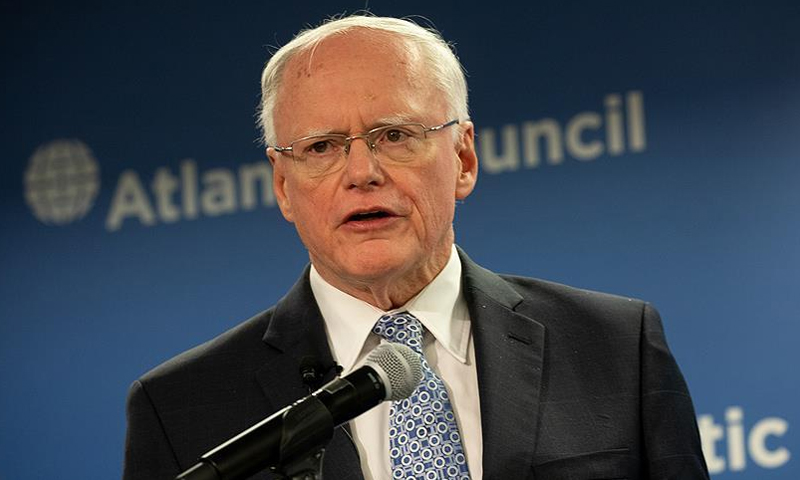
In an interview with Syrian media... Envoy James Jeffrey talks about US-UN cooperation
Three lines depict “slow” US policy in Syria

Enab Baladi – Murad Abdul Jalil
The ambiguity of the US policy toward Syria is continuing, amid the absence of a clear strategy in dealing with the Syrian regime and its allies, whether at the military level, especially with the Russian-backed attack on Idlib Governorate, or at the political level to counter procrastination in the work of the Constitutional Committee, which apparently will not be held soon.
The statements of the US officials focus on two matters: the first is the defeat of ISIS with the local ally, the Syrian Democratic Forces (SDF), in the eastern Euphrates, and the second is to ensure that no chemical weapons are used. Meanwhile, the Syrian regime and Russia continue bombing the opposition-controlled areas by land and air, without clear reactions, except for media statements not accompanied by real movements on the ground.
Idlib… No bombing with chemical weapons
Idlib Governorate in northern Syria has been subject to a military escalation for months, and daily bombing by aircraft and artillery of the forces of the Syrian regime and its Russian ally.
These attacks resulted in the death of 287 people, including 90 children, since November 1, 2019, in addition to the displacement of 63,065 families (359,000 people), as documented by the Syria Response Coordinators on January 7, 2020.
In contrast, the US is pursuing a “slow” policy to curb Russians, the regime, and Iran by imposing economic sanctions, according to the US special envoy for Syria, James Jeffrey.
During a closed session between Jeffrey and Syrian media, which Enab Baladi attended, the US envoy expressed his concerns over the situation in Idlib, and stressed that it is a problem that we currently face, but the most important thing is that “there is no use of chemical weapons there,” he said.
Jeffrey clarified that the regime and Russia did not achieve significant gains after a year and a half of the Turkish-Russian agreement in Sochi, in September 2018, on Idlib.
On the ground, however, the Syrian regime has been able to gnaw areas over successive stages from Idlib Governorate, the most recent of which is the land advance in the southeast and the control over 31 villages, with an area of 320 square kilometers, since December 9, 2019.
The media session of Envoy Jeffrey coincided with the death of 15 civilians and the injury of 94 others as a result of intensive airstrikes by Syrian warplanes on the city of Idlib and its eastern and southern countrysides, stated Mustafa Haj Youssef, the Head of the Civil Defense sector in Idlib, to Enab Baladi.
The escalation comes before the Russian-Turkish agreement on a ceasefire took effect starting from Sunday morning, January 12, according to the Turkish Ministry of Defense, and as confirmed by Russian President, Vladimir Putin, during a press conference with German Chancellor Angela Merkel, on Saturday evening.
Jeffrey pointed out that the US President, Donald Trump, was very clear with Syrians about Idlib, and was committed to implementing international resolution 2254 by reaching free and fair elections.
On December 26, 2019, Trump warned, via his Twitter account, that Russia, the Syrian regime and Iran would kill thousands of civilians in Idlib, northern Syria.
“Russia, Syria, and Iran are killing, or on their way to killing, thousands of innocent civilians in Idlib Governorate. Don’t do it! Turkey is working hard to stop this carnage,” he said on Twitter
No comment on SDF’s oil supply to the regime
To the east of Syria, Enab Baladi asked Jeffrey about the official US position on the supply of the US-backed SDF of fuels to the regime-controlled areas, despite the US sanctions on any company that supplies the regime with oil and the repeated threat to penalize those who violate these measures.
SDF commander Mazloum Abdi had officially admitted in an interview with Asharq Al-Awsat newspaper, on December 17, 2019, the supply of oil from wells in the east of the Euphrates to the regime-controlled areas, and confirmed that there is no agreement on the supply of oil, but rather this happens indirectly and everyone knows it.
However, Jeffrey avoided commenting and only talked about the US-SDF relationship, saying that “the US is working effectively with SDF to ensure the defeat of ISIS, and to ensure stability and security in the region, and we are sure that this will bear fruit.”
US-UN cooperation
Jeffrey also talked about the US-UN cooperation on several issues, the first of which is the Constitutional Committee, which has not made any progress since it was held in November 2019, and the regime’s procrastination during the second round of talks and its rejection of any agenda submitted by the opposition.
Jeffrey stressed that Washington is consulting with the UN envoy to Syria, Geir Pedersen, about the continuation of the work of the Committee, which was expected to be held in mid-January, according to statements by the grantor countries of the Astana path (Russia and Turkey). He also insisted that the US will not allow the Syrian regime to “dictate terms in the constitutional process.”
The second cooperation revolves around the continuation of consultations between the two sides in order to find a solution to the entry of aid to northeastern Syria after it was hindered at al-Yaarubiyah Border Crossing on the Syrian-Iraqi borders, according to the United Nations resolution voted on by the Security Council on January 10, 2020.
The UN Security Council voted in favor of a resolution allowing the continuation of providing cross-borders humanitarian aid via two border crossings in Turkey, namely Bab al-Salameh and Bab al-Hawa, for only six months. However, the Council excluded the border crossings of Ramtha with Jordan, and al-Yaarubiyah with Iraq, through which aid was entering the Autonomous Administration areas.
if you think the article contain wrong information or you have additional details Send Correction
النسخة العربية من المقال
-
Follow us :
Most viewed
- 311 casualties among government forces and civilians in Syrian coast
- Al-Sharaa and Abdi reach agreement on merger of SDF into Syrian state
- Syrian Defense Ministry appoints "Abu Amsha" as Hama Brigade commander
- Did Syrian state fall into coastal ambush?
- Rights organization documents government and civilian deaths in Syrian coast

















 A
A
A
A
A
A



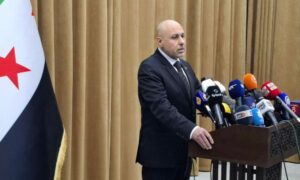
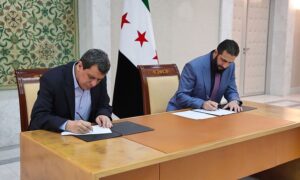
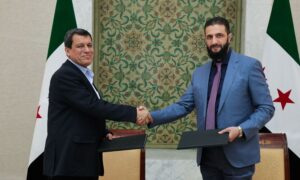
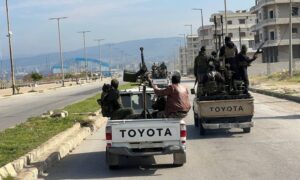
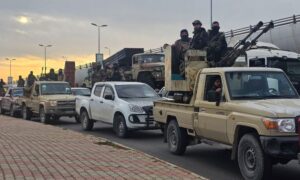
 More Politics
More Politics